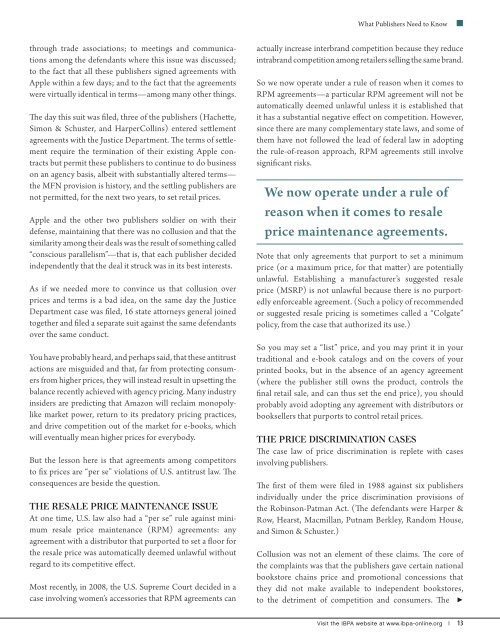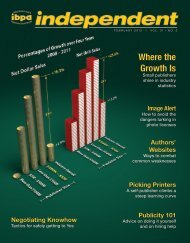Book- Business Lingo
Book- Business Lingo - Van-garde
Book- Business Lingo - Van-garde
Create successful ePaper yourself
Turn your PDF publications into a flip-book with our unique Google optimized e-Paper software.
What Publishers Need to Know■through trade associations; to meetings and communicationsamong the defendants where this issue was discussed;to the fact that all these publishers signed agreements withApple within a few days; and to the fact that the agreementswere virtually identical in terms—among many other things.The day this suit was filed, three of the publishers (Hachette,Simon & Schuster, and HarperCollins) entered settlementagreements with the Justice Department. The terms of settlementrequire the termination of their existing Apple contractsbut permit these publishers to continue to do businesson an agency basis, albeit with substantially altered terms—the MFN provision is history, and the settling publishers arenot permitted, for the next two years, to set retail prices.Apple and the other two publishers soldier on with theirdefense, maintaining that there was no collusion and that thesimilarity among their deals was the result of something called“conscious parallelism”—that is, that each publisher decidedindependently that the deal it struck was in its best interests.As if we needed more to convince us that collusion overprices and terms is a bad idea, on the same day the JusticeDepartment case was filed, 16 state attorneys general joinedtogether and filed a separate suit against the same defendantsover the same conduct.You have probably heard, and perhaps said, that these antitrustactions are misguided and that, far from protecting consumersfrom higher prices, they will instead result in upsetting thebalance recently achieved with agency pricing. Many industryinsiders are predicting that Amazon will reclaim monopolylikemarket power, return to its predatory pricing practices,and drive competition out of the market for e-books, whichwill eventually mean higher prices for everybody.But the lesson here is that agreements among competitorsto fix prices are “per se” violations of U.S. antitrust law. Theconsequences are beside the question.The Resale Price Maintenance IssueAt one time, U.S. law also had a “per se” rule against minimumresale price maintenance (RPM) agreements: anyagreement with a distributor that purported to set a floor forthe resale price was automatically deemed unlawful withoutregard to its competitive effect.Most recently, in 2008, the U.S. Supreme Court decided in acase involving women’s accessories that RPM agreements canactually increase interbrand competition because they reduceintrabrand competition among retailers selling the same brand.So we now operate under a rule of reason when it comes toRPM agreements—a particular RPM agreement will not beautomatically deemed unlawful unless it is established thatit has a substantial negative effect on competition. However,since there are many complementary state laws, and some ofthem have not followed the lead of federal law in adoptingthe rule-of-reason approach, RPM agreements still involvesignificant risks.We now operate under a rule ofreason when it comes to resaleprice maintenance agreements.Note that only agreements that purport to set a minimumprice (or a maximum price, for that matter) are potentiallyunlawful. Establishing a manufacturer’s suggested resaleprice (MSRP) is not unlawful because there is no purportedlyenforceable agreement. (Such a policy of recommendedor suggested resale pricing is sometimes called a “Colgate”policy, from the case that authorized its use.)So you may set a “list” price, and you may print it in yourtraditional and e-book catalogs and on the covers of yourprinted books, but in the absence of an agency agreement(where the publisher still owns the product, controls thefinal retail sale, and can thus set the end price), you shouldprobably avoid adopting any agreement with distributors orbooksellers that purports to control retail prices.The Price Discrimination CasesThe case law of price discrimination is replete with casesinvolving publishers.The first of them were filed in 1988 against six publishersindividually under the price discrimination provisions ofthe Robinson-Patman Act. (The defendants were Harper &Row, Hearst, Macmillan, Putnam Berkley, Random House,and Simon & Schuster.)Collusion was not an element of these claims. The core ofthe complaints was that the publishers gave certain nationalbookstore chains price and promotional concessions thatthey did not make available to independent bookstores,to the detriment of competition and consumers. TheVisit the IBPA website at www.ibpa-online.org | 13








